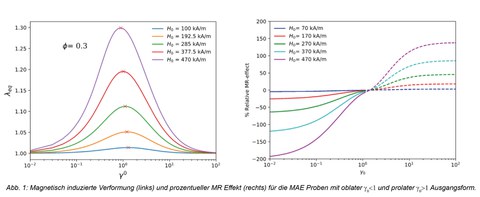Subproject 4: Constitutive modeling of anisotropic magneto-active elastomer composites
Table of contents
Motivation
Magneto-active elastomers (MAE) are used for various technical applications, such as soft actuators, acoustic metamaterials and transport systems for microfluidics. MAE are typically composite materials where magnetizable microparticles are integrated into a soft polymer network. In the presence of an external magnetic field, this material type is characterized by significant deformations and field-dependent mechanical modules. Initially isotropic samples show a particularly pronounced mechanical anisotropy when exposed to a magnetic field. Magnetically controlled MAE reactions can be considerably improved by implementing magnetizable particles in chain-like shapes into an elastomer matrix.
State of the art and preliminary research
The magneto-mechanical behavior of MAE was already intensively researched, thus generating numerous theoretical studies [1-3]. The direction and intensity of magnetic-based adaptivity within an external field H0 strongly depends on the aspect ratio of the sample in the field direction and the local arrangement of magnetizable particles. Within cohort 1 it was shown that MAE with an isotropic particle distribution provide a strong shape effect (cf. Fig. 1, left) and a pronounced magneto-mechanical anisotropy [4]. Moreover, a material model for ellipsoidal isotropic MAE was developed that is characterized by form-related constitutive parameters [4,5]. This model predicts that a high magnetorheological (MR) effect can be achieved across a wide spectrum of the original shape even at moderate field strengths (cf. Fig. 1, right).
Currently, there is a need for research regarding the modeling of chain-like structures with magnetizable particles and the derivation of analytical constitutive relations for magnetically as well as mechanically induced deformations and static moduli.

Fig. 1: Magnetically induced deformation (left) and procentual MR effect (right) for MAE samples with oblate and prolate initial shape
Scientific question and project objectives
By specifically adjusting the distribution of magnetizable particles and by taking into consideration their redistribution in an elastomer matrix when exposed to a magnetic field, the magneto-mechanical reaction of MAE can be significantly enhanced. The objective of this project is to model the magneto-mechanical behaviour of anisotropic MAE with chain-like, spatially distributed magnetizable particles. Modeling will be performed by means of a microscopic theory, thus enabling the derivation of analytical constitutive relationships for magnetically as well as mechanically induced deformations and static moduli. In addition, the consitutive parameters of anisotropic MAE as a function of the initial shape, the filler material concentration, the size and direction of the magnetic field will also be revealed. In terms of design and simulation, the material model can be implemented by soft actuators containing ellipsoidal anisotropic MAE inclusions for local reinforcement.
References
| [1] | Ivaneiko, D.; Toshchevikov, V.; Saphiannikova, M.; Heinrich, G.: Mechanical properties of magneto-sensitive elastomers: unification of the continuum-mechanics and microscopic theoretical approaches. Soft Matter 10 (2014) 2213-2225 |
| [2] | Romeis, D.; Kostrov, S.A.; Kramarenko, E.Y.; Stepanov, G.V.; Shamonin, M.; Saphiannikova, M: Magnetic-field-induced stress in confined magnetoactive elastomers. Soft Matter 16 (2020) 9047–9058 |
| [3] | Metsch, P.; Romeis, D.; Kalina, K.A.; Raßloff, A.; Saphiannikova, M.; Kästner, M: Magneto-mechanical coupling in magneto-active elastomers. Materials 14 (2021) 434 |
| [4] | Chougale, S.; Romeis, D.; Saphiannikova, M: Transverse isotropy in magnetoactive elastomers. J. Magn. Magn. Mater. 523 (2021) 167597 |
| [5] | Chougale, S.; Romeis, D.; Saphiannikova, M: Field-induced transversely isotropic shear response of ellipsoidal magnetoactive elastomers. Materials, submitted |
Contact
Institute of Fluid Mechanics, Faculty of Mechanical Science and Engineering at TU Dresden
Leibniz Institute of Polymer Science Dresden e.V. (IPF)
 © Jürgen Lösel
© Jürgen Lösel
Ms PD Dr. rer. nat. habil. Marina Grenzer
Leiterin Materialtheorie und Modellierung
Leibniz-Institut für Polymerforschung Dresden e.V.:
Leibniz-Institut für Polymerforschung Dresden e.V., Institut Theorie der Polymere, Leibniz-Institut für Polymerforschung Dresden e.V. Hohe Straße 6
01069 Dresden
Deutschland
